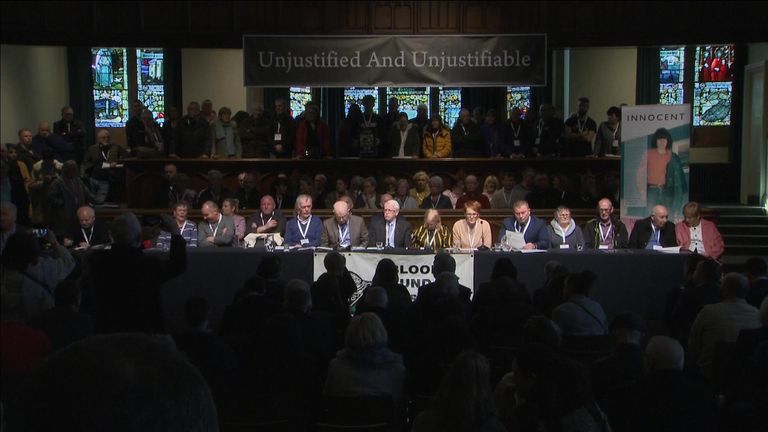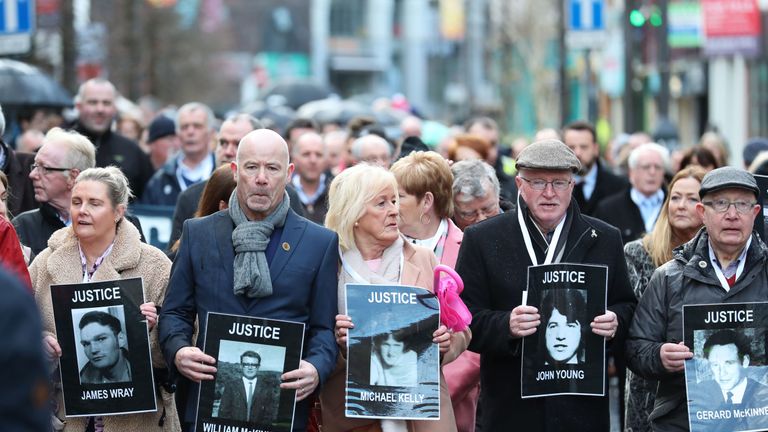Bloody Sunday: One former British soldier to be charged over Northern Ireland massacre
One former British soldier is to be charged with the murders of two men and the attempted murders of four others over the Bloody Sunday shootings in Londonderry.
There was insufficient evidence to provide a reasonable prospect of conviction for the other 16 former soldiers, the Northern Ireland Public Prosecution Service said.
Prosecutors also considered files on two former members of the old “Official IRA” and said they would not face prosecution.
The veteran paratrooper – who can only be identified as soldier F – will face prosecution for the murders of James Wray and William McKinney and the attempted murders of Joseph Friel, Michael Quinn, Joe Mahon and Patrick O’Donnell.
Families gathered outside The Museum of Free Derry, yards from where the killings took place 47 years ago, and marched together to the Guildhall in the city centre to hear the decision.
Relatives said they were “disappointed” not all the soldiers involved would be prosecuted, but added “justice for one family is justice for all of us”.
They also called for the ex-soldier to be prosecuted to be named, saying, “killers should not benefit from anonymity”, and said their campaign for justice was “not finished yet”.
Ciaran Shiels, a solicitor for a number of the relatives, said: “This is a remarkable achievement by the families and victims of Bloody Sunday.
“We are disappointed that not all of those responsible are to face trial.
“We will give detailed consideration to the reasons provided for decisions not to prosecute the other soldiers, with a view to making further submissions to the Prosecution Service and we shall ultimately challenge in the High Court, by way of judicial review, any prosecutorial decision that does not withstand scrutiny.”
Thirteen people were killed and 15 others injured on 30 January 1972 when troops of the 1st Battalion of the Parachute Regiment fired on demonstrators during a civil rights march in Derry.
An image of a Catholic priest waving a blood-stained handkerchief as he tried to help a victim to safety was seen around the world.
The troops were sent into the Bogside nationalist housing estate to deal with riots which followed the march defying a ban on public processions.
In 2010, a public inquiry under Lord Saville – ordered by former prime minister Tony Blair in 1998 – concluded the killings to have been “unjustified and unjustifiable”.
The investigation, which lasted 12 years and cost around £195m, dismissed suggestions the dead had been armed with guns and nail bombs.
It also criticised the decision to send soldiers into the estate in vehicles.
Papers before prosecutors included 668 witness statements and numerous photos, video and audio evidence.
Stephen Heron, Northern Ireland director of public prosecutions, said much of the material which was available for consideration was not admissible in criminal proceedings, due to the strict rules of evidence that apply.
He said he was aware it had been “a long road for the families to reach this point and today will be another extremely difficult day for many of them”.
Mr Heron stressed the decisions in no way undermined the findings of the Saville inquiry – that those shot were not posing a threat to the soldiers.
Defence Secretary Gavin Williamson said the Ministry of Defence would support soldier F and pay the legal costs.
He said: “We are indebted to those soldiers who served with courage and distinction to bring peace to Northern Ireland.
“The welfare of our former service personnel is of the utmost importance… and the government will urgently reform the system for dealing with legacy issues. Our serving and former personnel cannot live in constant fear of prosecution.”
Founder of the Justice for Northern Ireland Veterans group Alan Barry said: “It’s one soldier too many as far as we’re concerned.
“It’s very one-sided. No soldier should be charged. It happened 47 years ago, a line in the sand needs to be drawn and people need to move on.
“Under the terms of the Good Friday Agreement veterans are being left open to prosecution while terrorists have been cleansed of their past crimes.”
The paratroopers involved were not identified by the Saville inquiry. They were known only by a sequence of letters.
The outcome of the inquiry opened up the possibility of criminal charges being made against the troops involved.
Then prime minister David Cameron also apologised to the families of the victims in a statement in the House of Commons.
An investigation by the Police Service of Northern Ireland (PSNI) followed the inquiry and files on 18 soldiers were submitted to prosecutors in 2016 and 2017 for consideration. One veteran has since died.
Four other soldiers included in the Saville report died before police had completed their investigation.
Source: Read Full Article






